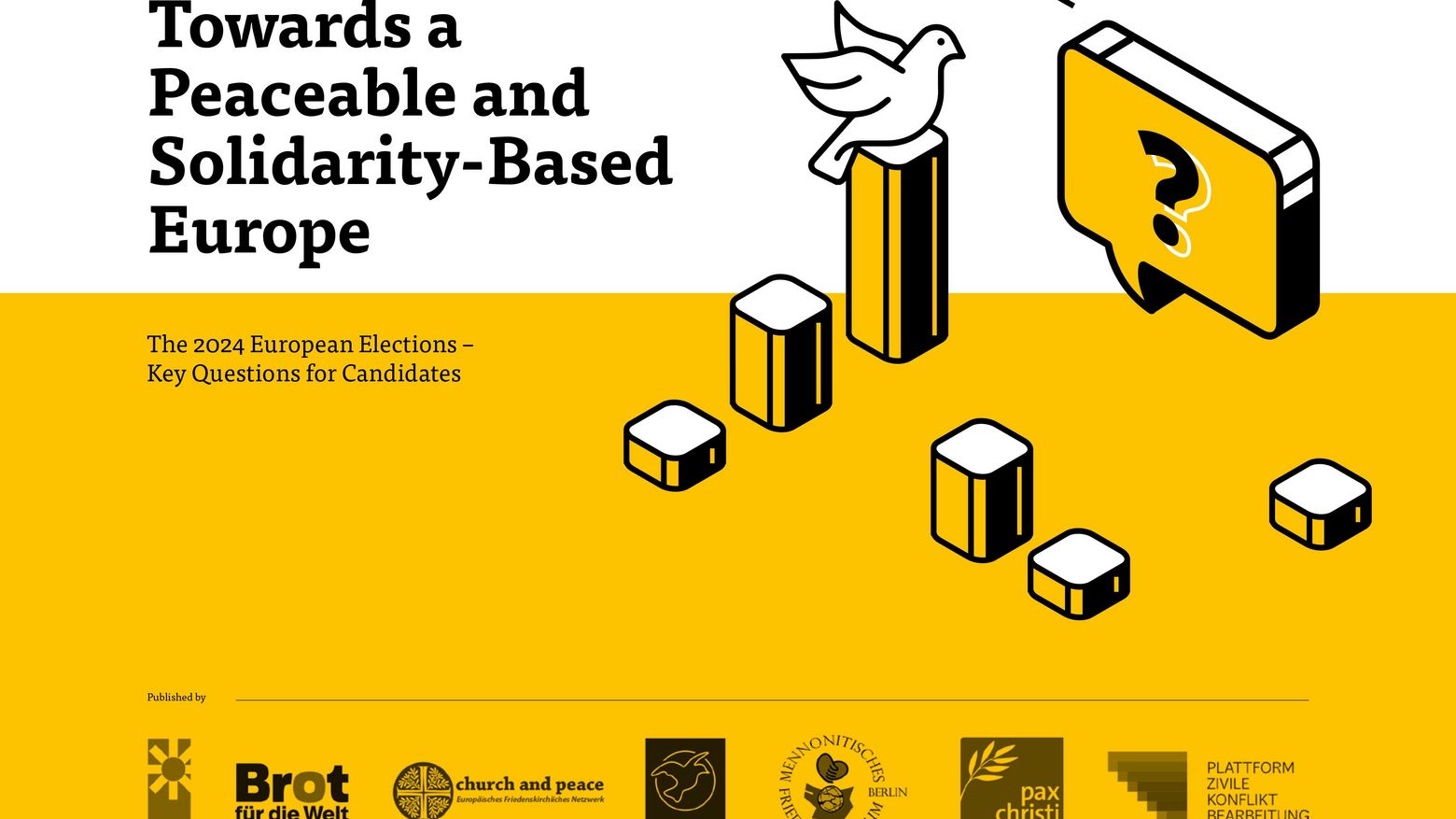In the context of Europe, it is, first and foremost, Russia’s war against Ukraine and the support provided to Ukraine by the EU and its Member States that have been in the foreground since February 2022. However, we wish to turn attention to other topics that are overshadowed by the war and therefore go largely unnoticed, even though they are of fundamental significance for further European and global development. The broschure „For a Peaceable Europe – Key Questions for Canditates“ is available here. Its editors are based in Germany (Brot für die Welt, Aktionsgemeinschaft Dienst für den Frieden, Plattform Civil Conflict Transformation, the European Network Church & Peace, Pax Christi, Forum Civil Peace Service and the Mennonite Peace Centre).
Sustainabe Policies for Climate and Environment, Disarmament and Human Security
The key questions are intended to encourage critical engagement with the candidates on the party lists and help ascertain where they would focus their energies if elected to the European Parliament. They will determine whether the EU’s policies will contribute to safeguarding the survival of humankind – or pose an ever-greater threat to our conditions of existence. The global challenges against which European policy must prove its worth include the development of credible climate and environmental policies, advocacy for a sustainable economy and fair trade, and a foreign and security policy which actively counters a new global arms race and defines security in terms of human as well as military security. Security policy must be shaped in such a way that isolationism and seclusion are avoided. And security in Europe should not be achieved at the expense of security and human rights elsewhere.
More justice in relations with countries of the Global South and Restriction of Arms Export
It is therefore important to provide reliable support for the establishment of institutions for peaceful dispute resolution and mechanisms for civil conflict management – at European and global level. Here, governmental and civil society actors must work together. This can only succeed through the sharing of their skills and experience. At the same time, European policy can claim credibility in the world only if it puts relations with the countries of the Global South on a new and fairer footing, addresses the causes of violent conflicts and critically examines its own contributions to the absence of peace. Countless weapons that are used to commit grievous human rights abuses and war crimes worldwide are manufactured in Europe – and that needs to change. In shaping its foreign, security and development policy, the EU should focus on addressing the causes of violent conflicts and bring influence to bear at an early stage to prevent their escalation. A further challenge is to ensure that funding for development cooperation and civil crisis prevention is not misused for the purpose of migration control or security policy measures. Europe’s peaceability and credibility also depends on the question how member states deal with migrants and refugees, and whether they are willing to protect their rights.
Developing the EU as a Peace Project
The European Union first emerged as a peace project. It motivated formerly hostile nations that had clashed on world war battlefields to engage in peaceful cooperation; after the end of the Cold War, it also helped to overcome the East-West division of Europe. The EU rightly requires its members to commit to democratic standards, peaceful conflict resolution and human rights. However, in order to be credible, the EU member states need to live the values they proclaim. Therefore, the EU has to put its focus on human rights and should avoid flirts with dictators in order to secure its own security interests. The EU needs to evolve as a peace project in its external relations as well. Right now, new arms control and disarmament initiatives are urgently needed once more, not only in Europe but also at the global level.
Key Areas & Questions for Candidates
Questions for the European election candidates should aim to establish which policy course they would pursue in relation to strengthening civil conflict management and peacebuilding, disarmament and arms(export)control.
The paper covers the following topics:
- Expand peacebuilding and civil peace missions
- Towards a human rights-based asylum and migration policy
- More justice in relations with countries of the Global South
- Restrict and control defence projects and arms exports
- Revitalise arms control and reduce nuclear weapons
Please contact the candidates and ask them about the measures they propose in order to strenghten instruments for conflict transformation and peacebuilding, disarmament and arms(export)control. The party manifestos for the European elections are available online, along with the lists of candidates.





